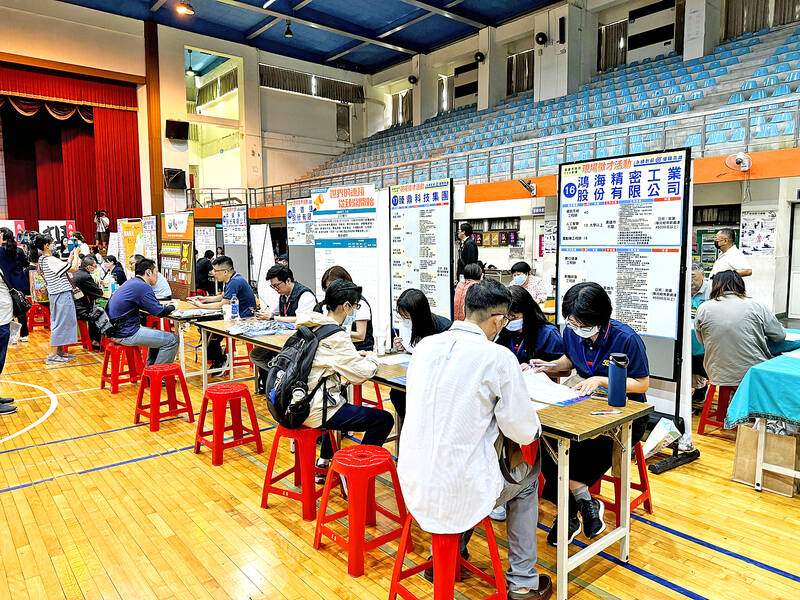Taiwanese workers earned an average of NT$47,000 per month this year, but 40 percent are struggling financially and 18 percent plan to switch jobs within 12 months, two separate surveys showed yesterday.
The amount equals a 5.4 percent increase from a year earlier to a decade high, 104 Job Bank (104人力銀行) said.
The government is due to review the nation’s minimum wages.

Photo: Hsu Li-chuan, Taipei Times
Employees at computer and consumer electronics manufacturers reported the highest average monthly wage of NT$60,000 a month, followed by semiconductor firms at NT$59,000, and vendors of shoe and textile products, along with software and Internet businesses at NT$55,000, 104 Job Bank said.
Tech firms and financial institutes offered higher monthly wages than others, while 40 of 63 sectors offered wages below the average, it said.
Monthly wages for employees at social welfare companies was NT$38,000, while wedding studios, hair salons and property managers paid NT$39,000 to NT$40,000, it said.
Average monthly wages at restaurants, retailers, hotels and recreational facilities also underperformed at about NT$43,000, it said.
The average salary increased NT$1,454 after inflation adjustment, it said.
However, the highest-paying jobs offered 57 percent higher salary than the lowest-paying jobs, it said.
The findings pose challenges for employers seeking to recruit talent, the job bank said, as Taiwan’s economic recovery is gaining traction and labor shortages have exceeded 1 million for 16 consecutive months.
The data also help explain why most Taiwanese workers are overwhelmed with inflation and do not feel the benefits of economic growth, it said.
A separate survey by consultancy firm PricewaterhouseCoopers Taiwan showed that 57 percent of employees in Taiwan had surplus money after paying their bills, while 40 percent were having financial difficulties.
A total of 33 percent of employees said their job became more challenging last year and their workload had significantly increased, the advisory firm said, adding that 17 percent said their workload was unbearable.
Eighteen percent of workers were considering changing jobs within 12 months and 51 percent planned to learn new skills, the survey showed.
Ninety percent of workers believed that generative artificial intelligence would enhance their working efficiency and 36 percent were looking at better pay because of the new technology, the survey said.

Sweeping policy changes under US Secretary of Health and Human Services Robert F. Kennedy Jr are having a chilling effect on vaccine makers as anti-vaccine rhetoric has turned into concrete changes in inoculation schedules and recommendations, investors and executives said. The administration of US President Donald Trump has in the past year upended vaccine recommendations, with the country last month ending its longstanding guidance that all children receive inoculations against flu, hepatitis A and other diseases. The unprecedented changes have led to diminished vaccine usage, hurt the investment case for some biotechs, and created a drag that would likely dent revenues and

Global semiconductor stocks advanced yesterday, as comments by Nvidia Corp chief executive officer Jensen Huang (黃仁勳) at Davos, Switzerland, helped reinforce investor enthusiasm for artificial intelligence (AI). Samsung Electronics Co gained as much as 5 percent to an all-time high, helping drive South Korea’s benchmark KOSPI above 5,000 for the first time. That came after the Philadelphia Semiconductor Index rose more than 3 percent to a fresh record on Wednesday, with a boost from Nvidia. The gains came amid broad risk-on trade after US President Donald Trump withdrew his threat of tariffs on some European nations over backing for Greenland. Huang further

Macronix International Co (旺宏), the world’s biggest NOR flash memory supplier, yesterday said it would spend NT$22 billion (US$699.1 million) on capacity expansion this year to increase its production of mid-to-low-density memory chips as the world’s major memorychip suppliers are phasing out the market. The company said its planned capital expenditures are about 11 times higher than the NT$1.8 billion it spent on new facilities and equipment last year. A majority of this year’s outlay would be allocated to step up capacity of multi-level cell (MLC) NAND flash memory chips, which are used in embedded multimedia cards (eMMC), a managed

CULPRITS: Factors that affected the slip included falling global crude oil prices, wait-and-see consumer attitudes due to US tariffs and a different Lunar New Year holiday schedule Taiwan’s retail sales ended a nine-year growth streak last year, slipping 0.2 percent from a year earlier as uncertainty over US tariff policies affected demand for durable goods, data released on Friday by the Ministry of Economic Affairs showed. Last year’s retail sales totaled NT$4.84 trillion (US$153.27 billion), down about NT$9.5 billion, or 0.2 percent, from 2024. Despite the decline, the figure was still the second-highest annual sales total on record. Ministry statistics department deputy head Chen Yu-fang (陳玉芳) said sales of cars, motorcycles and related products, which accounted for 17.4 percent of total retail rales last year, fell NT$68.1 billion, or